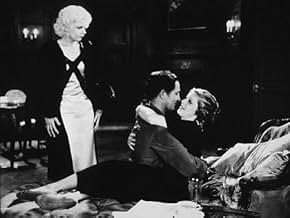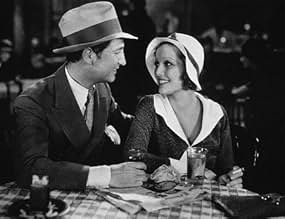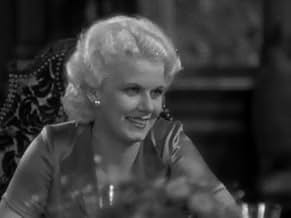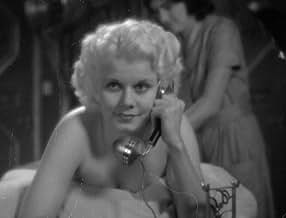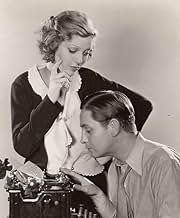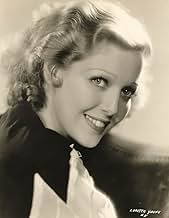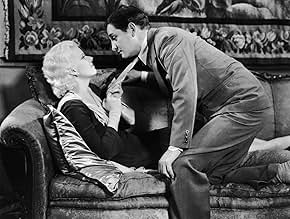IMDb RATING
6.7/10
3.9K
YOUR RATING
A young woman from a very rich family impulsively marries a reporter, but each assumes the other is the one whose lifestyle must change.A young woman from a very rich family impulsively marries a reporter, but each assumes the other is the one whose lifestyle must change.A young woman from a very rich family impulsively marries a reporter, but each assumes the other is the one whose lifestyle must change.
- Awards
- 2 wins total
Don Dillaway
- Michael Schuyler
- (as Donald Dillaway)
Claud Allister
- Dawson - The Valet
- (as Claude Allister)
Wilson Benge
- Butler
- (uncredited)
Vance Carroll
- Reporter
- (uncredited)
Eddy Chandler
- Hank - A Reporter
- (uncredited)
Richard Cramer
- Speakeasy Proprietor
- (uncredited)
Oliver Eckhardt
- Reporter
- (uncredited)
Adolph Faylauer
- Party Guest
- (uncredited)
J.C. Fowler
- Reporter
- (uncredited)
6.73.9K
1
2
3
4
5
6
7
8
9
10
Featured reviews
A Delight
There is a scene with Robert Williams and Jean Harlow singing a ditty to each other. There was such natural wit and affection that their infatuation and joy in each others company was perfectly expressed. This was love, this was sensuality, without a hint of the physicality that modern movies are forced to graphicly depict. Seeing a movie like this, made in low fidelity black and white seventy years ago shows what we have lost.
A Robert Williams showcase
After watching Platinum Blonde, I, like most other viewers, had to look up Robert Williams, wondering whatever happened to him while fearing the worst, the worst being true: he died shortly after he made this film. Tragic! One can wonder endlessly over what might have been. What is clear is that he was a natural for the camera, was highly skilled (years of stage experience behind him), and fit perfectly into the Capra-Riskind universe of tough-but- articulate Everyman up against monied mediocrities. He might well have ended up playing the Clark Gable role in It Happened One Night if he had been around at the time. In fact, the reporter he plays here seems like a first draft for that character. (The plot involves Williams as a reporter falling in love impulsively with the daughter of a wealthy Social Register family only to encounter the usual boobytraps built into such a union.)
The movie itself, though hard to separate from Williams's domination of it, stands up fairly well on its own. There are some imaginative camera movements and setups and intelligent, witty dialogue laced with fizzy Depression-era argot. The story is not very convincing but you suspend disbelief because of the way the actors, dialogue and cinematography bring it to life. The pace is leisurely, sometimes a bit too much so, with many minutes taken up in gentle, playful, ultra-naturalistic banter between Williams and his co-stars. I can't think of another film from that period that detoured so often into that type of throwaway conversational interlude.
Jean Harlow as the heiress and Loretta Young as a newspaper columnist are not ideally cast. Their roles should have been reversed, but it doesn't really matter because both actresses do well. Harlow, who by this time had had relatively little experience in front of a camera, seems right at home about 90% of the time. And it's hard to believe that Loretta Young was only 18 when she made this! But she had already been a veteran of several years standing as a film actress.
The movie itself, though hard to separate from Williams's domination of it, stands up fairly well on its own. There are some imaginative camera movements and setups and intelligent, witty dialogue laced with fizzy Depression-era argot. The story is not very convincing but you suspend disbelief because of the way the actors, dialogue and cinematography bring it to life. The pace is leisurely, sometimes a bit too much so, with many minutes taken up in gentle, playful, ultra-naturalistic banter between Williams and his co-stars. I can't think of another film from that period that detoured so often into that type of throwaway conversational interlude.
Jean Harlow as the heiress and Loretta Young as a newspaper columnist are not ideally cast. Their roles should have been reversed, but it doesn't really matter because both actresses do well. Harlow, who by this time had had relatively little experience in front of a camera, seems right at home about 90% of the time. And it's hard to believe that Loretta Young was only 18 when she made this! But she had already been a veteran of several years standing as a film actress.
Poor Boy Marries Rich Girl
In The Films Of Frank Capra Citadel Film Series and in his memoirs, Frank Capra described Platinum Blonde as a film that Columbia did strictly as a moneymaker, no messages of social significance that would be found in his later classic work, just a nice girl-boy-girl comedy. Still and probably because Robert Riskin did some of the dialog I found plenty of things that would be instantly recognizable in Capra's more well known films.
The Platinum Blonde is of course Jean Harlow and this film title gave her the title she would have the rest of her short life. She's a society girl who sweeps reporter Robert Williams off his feet and into marriage much to the chagrin of her formidable dowager mother Louise Closser Hale.
Someone else is chagrined as well, Loretta Young who was only 18 when she made this film. Loretta and her sisters added a few years onto their ages in order to work back then. Loretta plays one of Williams fellow reporters who is known only by her last name of Gallagher. Just like Jean Arthur was known as Saunders in Mr. Smith Goes To Washington. Lots of similarities between the two though Arthur's character was far more sophisticated than Young.
Still Platinum Blonde more closely resembles Mr. Deeds Goes To Town. Williams is like Gary Cooper trapped in that big mansion. Only it was Cooper's own mansion that he inherited. Robert Williams is in on a pass and on a kind of probation so to speak, to see if he can adjust to life among the idle rich. In 1931 lots of people would have liked to have been given the opportunity.
The only one in the household he strikes up some kind of friendship with is butler Halliwell Hobbes. Note the echo business with them, it would be repeated in Mr. Deeds.
The week Platinum Blonde was released with reviews acclaiming Williams as a new star, he died of peritonitis. What an incredible loss, he was an actor with a breezy insouciance just like Robert Montgomery or William Haines over at MGM. He probably could also have done parts at Columbia that James Cagney was doing at Warner Brothers. Williams could have been Harry Cohn's first major star of the sound era. Anyway his comic timing was perfect and he steals the film from those two movie legends who were his leading ladies.
You'll also like Reginald Owen's portrayal as Harlow's family attorney and general busybody. Williams also deals with him in the way Gary Cooper ultimately dealt with his shyster.
Platinum Blonde is one of Frank Capra's best early films and watching it will make you sad though when you see Robert Williams and you will agree that he had a brilliant career ahead of him.
The Platinum Blonde is of course Jean Harlow and this film title gave her the title she would have the rest of her short life. She's a society girl who sweeps reporter Robert Williams off his feet and into marriage much to the chagrin of her formidable dowager mother Louise Closser Hale.
Someone else is chagrined as well, Loretta Young who was only 18 when she made this film. Loretta and her sisters added a few years onto their ages in order to work back then. Loretta plays one of Williams fellow reporters who is known only by her last name of Gallagher. Just like Jean Arthur was known as Saunders in Mr. Smith Goes To Washington. Lots of similarities between the two though Arthur's character was far more sophisticated than Young.
Still Platinum Blonde more closely resembles Mr. Deeds Goes To Town. Williams is like Gary Cooper trapped in that big mansion. Only it was Cooper's own mansion that he inherited. Robert Williams is in on a pass and on a kind of probation so to speak, to see if he can adjust to life among the idle rich. In 1931 lots of people would have liked to have been given the opportunity.
The only one in the household he strikes up some kind of friendship with is butler Halliwell Hobbes. Note the echo business with them, it would be repeated in Mr. Deeds.
The week Platinum Blonde was released with reviews acclaiming Williams as a new star, he died of peritonitis. What an incredible loss, he was an actor with a breezy insouciance just like Robert Montgomery or William Haines over at MGM. He probably could also have done parts at Columbia that James Cagney was doing at Warner Brothers. Williams could have been Harry Cohn's first major star of the sound era. Anyway his comic timing was perfect and he steals the film from those two movie legends who were his leading ladies.
You'll also like Reginald Owen's portrayal as Harlow's family attorney and general busybody. Williams also deals with him in the way Gary Cooper ultimately dealt with his shyster.
Platinum Blonde is one of Frank Capra's best early films and watching it will make you sad though when you see Robert Williams and you will agree that he had a brilliant career ahead of him.
Nice, bristling romantic comedy
PLATINUM BLONDE marks the start of three careers- First, Frank Capra. He has a natural style of handling actors. There is scene where lovebirds Jean Harlow and Robert Williams mock sing-song to each other. It feels improvised, very natural, unlike the stage learned dialog that infested early talkies. He's experimental with camera angles, and playing with sound (One scene is filmed by a crackling fountain) and he keeps the pace and dialog delivery going at rocket pace. Then you have Jean Harlow. Wow, do you have Jean Harlow! Not only is she stunningly beautiful (even when photographed from behind) but she has a cool, likable wit (She suppose to be a society dame, but she makes the character so likable, you just want to hang around). Thirdly, you have Robert Williams, who was just starting to make a name for himself with this 1931 film. Sadly, this bristling talent died later that year of appendicitis. He's wonderfully energetic, quirky and full of speed (He's so wonderfully jumpy when he feels enclosed in a stuffy mansion you'd think he has Starbucks running through his viens.) PLATINUM BLONDE seems to be dress rehersal for the film Capra would make five years later- MR. DEEDS GOES TO TOWN (My favorite Capra film) Williams (Like Gary Cooper) is labeled "Cinderella Man", he loves yodelling and getting the servants to yodel in his newfound mansion home. Catch this film if you can.
Unusual performance
The most notable thing about this movie is Robert Williams unusual performance. I've seen performances like it but none of them were in 1931 and I was surprised I'd never heard of him. Turns out he *died* in 1931, and it's worth watching the movie just to see someone who could have been a star. The movie itself is quite enjoyable, although Harlow makes little impression as a society dame and it's difficult to believe the enticing Loretta Young could be any one's idea of "one of the boys."
Did you know
- TriviaIn a 2008 interview, actor Christopher Plummer called Williams "...one of the most realistic comedians the screen had. He made Cary Grant look like he was overacting... To watch Robert Williams act was like seeing a comic using the Method, long before the Method became famous with Marlon [Brando] (Marlon Brando) and Monty [Clift] (Montgomery Clift)."
- GoofsWhen they are looking at the front page of "The Tribune Paper", in the headlines, the word "okay" is misspelled. It shows "It's okey with me."
The spelling of "OK" was not standardized for a long time. Writer Dashiell Hammett among others spelled it "okeh" and "oke",
- Quotes
Dexter Grayson: Where were you yesterday?
Anne Schuyler: Oh, Stew and I went for a long ride. Dexter, is there any finishing school we could send him to?
Dexter Grayson: Yes - Sing Sing!
- ConnectionsEdited into 365 Days, also Known as a Year (2019)
- How long is Platinum Blonde?Powered by Alexa
Details
- Release date
- Country of origin
- Official sites
- Language
- Also known as
- Gallagher
- Filming locations
- Production company
- See more company credits at IMDbPro
Box office
- Budget
- £600,000 (estimated)
- Runtime
- 1h 29m(89 min)
- Color
Contribute to this page
Suggest an edit or add missing content

